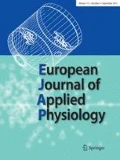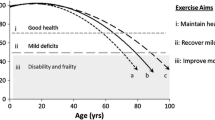Abstract
Increasing evidence suggests that physical activity can prevent some aspects of mental illness in older people such as depression, dementia and Alzheimer’s disease. Additionally, limited research has shown that engagement in structured exercise can improve aspects of psychological well-being such as mood and self-perceptions in older adults. However, the relationship between incidental daily activity such as walking or time spent sedentary, with psychological well-being has not been investigated. The Better Ageing Project provided an opportunity to assess well-being and quality of life using standardised questionnaires with 176 adults aged 70 and over. Accelerometry was used to objectively assess daily energy expended in physical activity at different levels of intensity. In addition, an assessment of the impact of the 12-month Better Ageing structured group exercise programme was assessed through questionnaires and interviews. Total daily physical activity energy expenditure (joules/day) and amount of time spent in activity of at least moderate intensity were weakly related (r = 0.20–0.28) to quality of life, subjective well-being and physical self-perceptions. Time spent sedentary (min/day) was weakly and negatively related to several mental health indicators. The quantitative data showed only minor psychological benefits of the exercise intervention. In contrast, interviews with 27 research participants and 4 exercise leaders suggested that important improvements in perceived function and social benefits had been experienced.
Similar content being viewed by others
Notes
Real names have been replaced with pseudonyms which are followed by the real age of the participants.
References
Abbott RD (2004) Walking and dementia in physically capable elderly men. JAMA 292:1447–1453
Barbour KA, Blumenthal JA (2005) Exercise training and depression in older adults. Neurobiol Aging 26:S119–S123
Biddle SJH, Faulkner GE (2002) Psychological and social benefits of physical activity. In: Chan KM, Chodzko-Zajko W, Frontera W, Parker A (eds) Active aging. Lippincott, Williams & Wilkins, Hong Kong, pp 89–164
Blumenthal JA, Babyak MA, Moore KA, Craighead E, Herman S, Khatri P, Waugh R, Napolitano MA, Forman LM, Appelbaum M, Doraiswamy PM, Krishnan KR (1999) Effects of exercise training on older patients with major depression. Arch Intern Med 159:2349–2356
Cattan M, White M, Bond J, Learmouth A (2005) Preventing social isolation and loneliness among older people: a systematic review of health promotion interventions. Ageing Soc 25
Colcombe S, Kramer AF (2003) Fitness effects on the cognitive function of older adults: a meta-analytic study. Psychol Sci 14:125–130
Craig CL, Marshall AL, Sjostrom M, Bauman AE, Booth ML, Ainsworth BE, Pratt M, Ekelund U, Yngve A, Sallis JF, Oja P (2003) International physical activity questionnaire: 12-country reliability and validity. Med Sci Sports Exerc 35:1381–1395
De Girolamo G, Becchi A, Coppa FS, De Leo D, Neri G, Rucci P, Scocco P (2000) Salute e qualità della vita Centro Scientifico Editore, Torino
Department of Health (2001) National Service Framework for older people. Modern standards and service models. Department of Health, London
Department of Health (2004) At least five a week: evidence on the impact of physical activity and its relationship to health. A report from the Chief Medical Officer. Department of Health, London
Diener E, Emmons A, Larsen RJ, Griffin S (1985) The Satisfaction with Life Scale: a measure of life satisfaction. J Pers Assess 49:71–75
Dupuy HJ (1984) The psychological General Well-Being (PGWB) index. In: Wenger NK, Mattson ME, Furberg CD, Elinson J (eds) Assessment of the quality of life in clinical trials of cardiovascular therapies. Lejacq, New York, pp 170–183
Fiatarone-Singh MA (2002) Exercise comes of age: rationale and recommendations for a geriatric exercise prescription. J Gerontol A Biol Sci Med Sci 57:262–282
Fox KR, Corbin CB (1989) The Physical Self-Perception Profile - Development and preliminary validation. J Sport Exerc Psychol 11:408–430
Fox KR, Stathi A (2002) Physical activity and mental health in older adults: Current evidence and future perspectives. Psychol J Greek Psychol Soc 9:563–580
Frank JS, Patla AE (2003) Balance and mobility challenges in older adults: Implications for preserving community mobility. Am J Prev Med 25:157–163
Keysor LJ (2003) Does late-life physical activity or exercise prevent or minimise disablement? Am J Prev Med 25:129–136
Laurin D, Verreault R, Lindsay J, MacPherson K, Rockwood K (2001) Physical activity and risk of cognitive impairment and dementia in elderly persons. Arch Neurol 58:498–504
Leplege A, Rèveilliére C, Ecosse E, Caria A, Riviére H (2000) Propriétés psychométriques d’un novel instrument d’évaluation de la qualité de vie, le WHOQOL-26: à partir d’nue population de malades neuro-musculataires. Encephale 26:13–22
McAuley E, Blissmer B, Katula J, Duncan TE, Mihalko SL (2000a) Physical activity, self-esteem, and self-efficacy relationships in older adults: A randomized controlled trial. Ann Behav Med 22:131–139
McAuley E, Blissmer S, Marquez DX, Jerome GJ, Kramer AF, Katula J (2000b) Social relations, physical activity, and well-being in older adults. Prev Med 31:608–617
McAuley E, Rudolph D (1995) Physical activity, aging and psychological well-being. J Aging Phys Act 3:67–96
McAuley E, Elavsky S, Jerome GJ, Konopack JF, Marquez DX (2005) Physical activity-related well-being in older adults: Social cognitive influences. Psychol Aging 20:295–302
Miller M, Rejeski WJ, Reboussin BA, TenHave T, Ettinger W (2000) Physical activity, functional limitations, and disability in older adults. J Am Geriatr Soc 48:1264–1272
Pavot W, Diener E (1993) Review of the Satisfaction with Life Scale. Psychol Assess 5:164–172
Pavot W, Diener E, Colvin C, Sandvik E (1991) Further validation of the Satisfaction with Life Scale: evidence for the cross-method convergence of well-being measures. J Pers Assess 57:149–161
Power M, Quinn K, Schmidt S, Group TW (2005) Development of hte to the WHOQOL-OLD module. Qual Life Res 14:2197–2214
Rejeski WJ, Mihalko SL (2001) Physical activity and quality of life in older adults. J Gerontol Med Sci 56A:23–35
Rovio S, Kareholt L, Helkala EL, Viitanen M, Winblad B, Tuomilehto J, Soininen H, Nissinen A, Kivipelto M (2005) Leisure-time physical activity at midlife and the risk of dementia and Alzheimer’s disease. Lancet Neurol 4:705–711
Smith JA, Osborn M (2003) Interpretive phenomenological analysis. In: Smith JA (ed) Qualitative psychology a practical guide to research methods. Sage, London, pp 51–81
Stathi A (2001) Physical activity and subjective well-being in active older adults. Department of Exercise and Health Sciences, Bristol University, Bristol
Stathi A, Fox KR (2004) The dimensions of a well-being scale designed for older adults: the ageing-well profile. J Aging Phys Act 12:300
Stathi A, Fox KR, McKenna J (2002) Physical activity and dimensions of subjective well-being in older adults. J Aging Phys Act 10:76–92
Stathi A, McKenna J, Fox KR (2003) The experiences of older people participating in exercise referral schemes. R J Promot Health 124:18–23
Strawbridge WJ, Deleger S, Roberts RE, Kaplan GA (2002) Physical activity reduces the risk of subsequent depression for older adults. Am J Epidemiol 156:328–334
Taylor AH, Cable NT, Faulkner GE, Hillsdon M, Narici M, Van der Bij AK (2004) Physical activity and older adults: a review of health benefits and the effectiveness of interventions. J Sports Sci 22:703–725
Washburn RA, Ficker JL (1999) Physical Activity Scale for the Elderly (PASE): the relationship with activity measured by a portable accelerometer. J Sports Med Phys Fitness 39:336–340
WHOQOLGroup (1998) Development of the WHOQOL BREF quality of life assessment. Psychol Med 28:551–558
World Health Organisation (2002) Active ageing: a policy framework. World Health Organisation, Geneva
Yaffe K, Barnes D, Nevitt M, Lui LY, Covinsky K (2001) A prospective study of physical activity and cognitive decline in elderly women: women who walk. Arch Intern Med 161:1703–1708
Young A, Dinan S (2005) Activity in later life. Br Med J 330:189–191
Acknowledgements
This study was supported by the European Commission Framework V fund (‘Better-Ageing’ Project No QLRT-2001-00323). The authors wish to thank Dr Lijung Chen for her assistance with statistical analyses
Author information
Authors and Affiliations
Corresponding author
Rights and permissions
About this article
Cite this article
Fox, K.R., Stathi, A., McKenna, J. et al. Physical activity and mental well-being in older people participating in the Better Ageing Project. Eur J Appl Physiol 100, 591–602 (2007). https://doi.org/10.1007/s00421-007-0392-0
Accepted:
Published:
Issue Date:
DOI: https://doi.org/10.1007/s00421-007-0392-0




